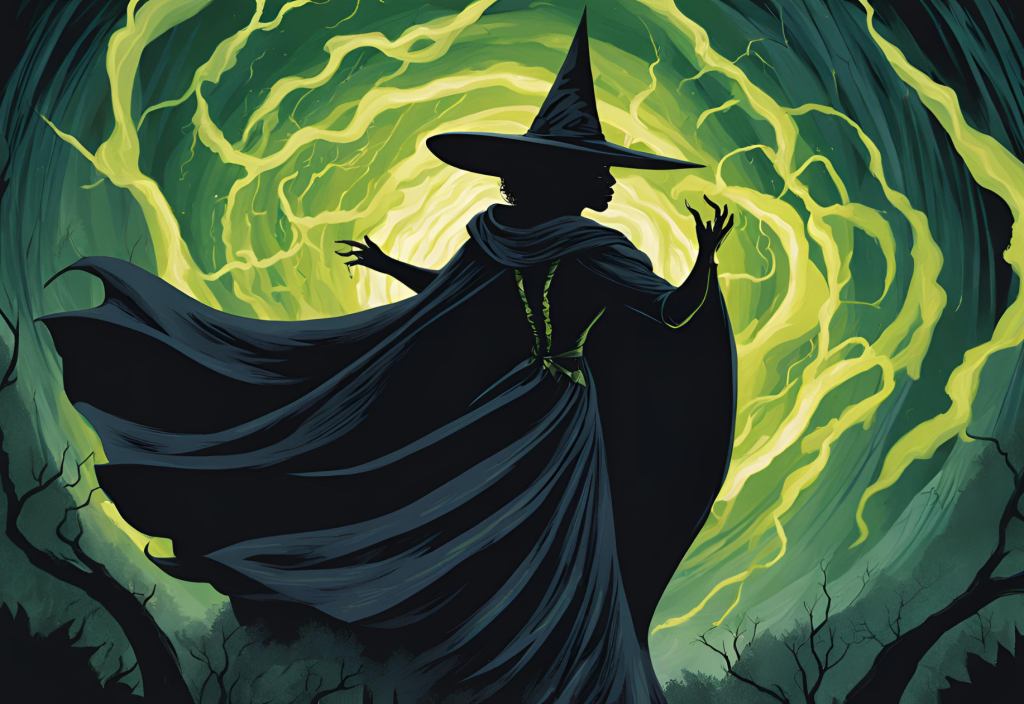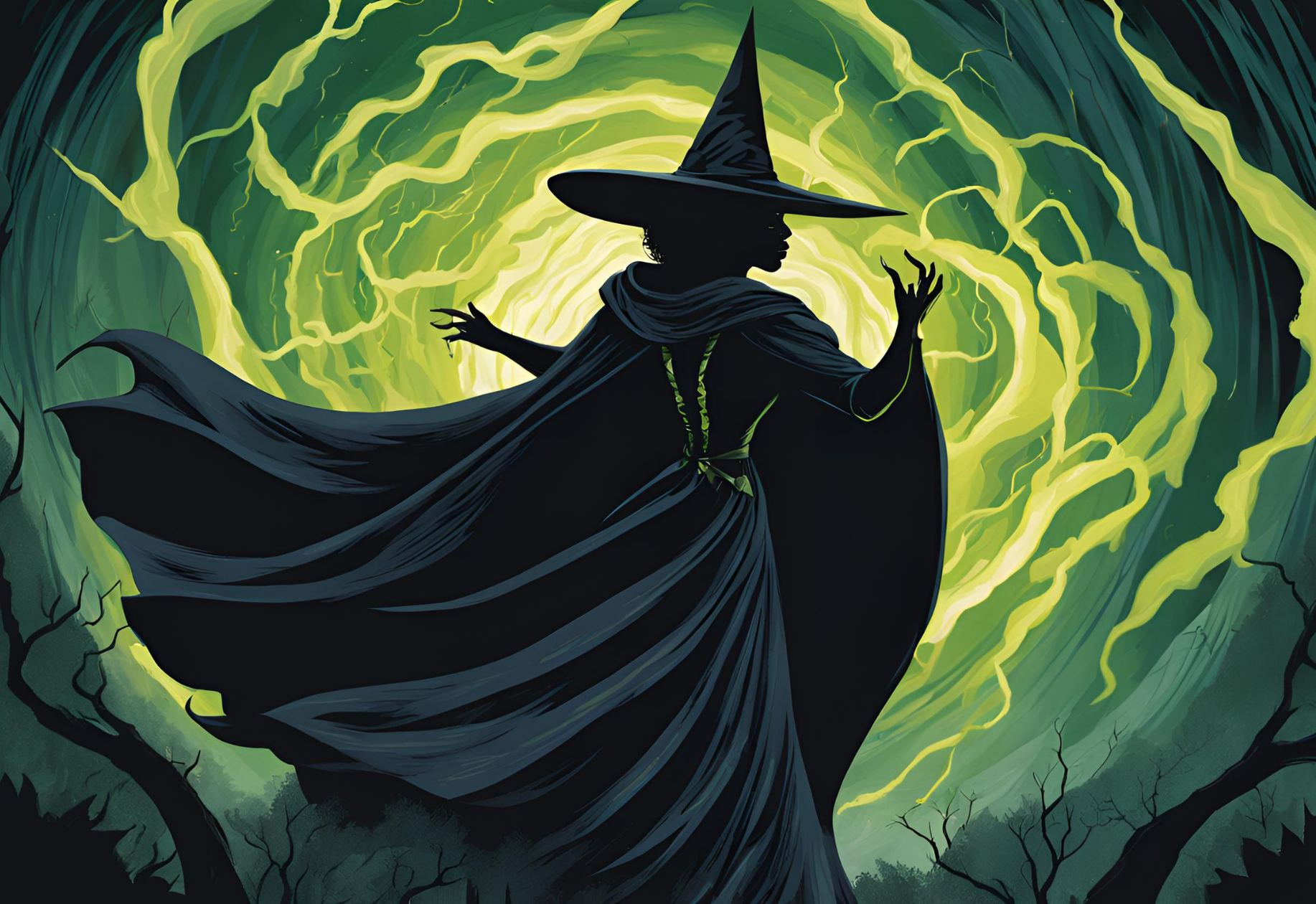“History makes music, and music makes history.” – Irving Berlin

It’s true—people are holding space for the lyrics of “Wicked’s” power ballad “Defying Gravity,” as the viral interview of Cynthia Erivo and Ariana Grande suggests. And witticisms aside, maybe they should. The musical speaks to the cyclicism of American politics, anti-intellectualism, and the cult of personality we can’t seem to escape in the Land of Liberty.
Nikai Mitchell, a young Black woman interviewed by USA Today, found herself “crying uncontrollably” in the AMC theater, as a story of a young woman being ostracized and heckled for having green skin held unmistakable resemblance to her own lived experience as a young Black woman in America.
The director John M. Chu said, “A charismatic leader who gaslights a community that this woman is wicked just because she’s standing up for a marginalized group of people in the society, how could that be political?”
The musical “Wicked,” which debuted on Broadway nearly 21 years ago, was based on Gregory Maguire’s 1995 novel “Wicked: The Life and Times of the Wicked Witch of the West,” an anti-fascist treatise where his Wizard assumes a clearly Hitler-like stance of leadership. When the musical emerged in 2003, it was a glaringly obvious critique of the George W. Bush administration and its invasion of Iraq, where Bush falsely claimed Iraq had weapons of mass destruction, just as the Wizard persecutes animals based on a big lie. The Wizard sings, “Is one a crusader or ruthless invader?” alluding to Bush’s description of the invasion as a “crusade.”
Perhaps viewers expected to see more touching moments of the classic musical with its heartwarming tale of female friendship, but the plot line instead revealed a provocative allegory for American politics right now, in 2024. Vox’s Constance Grady compares the despotic Wizard of Oz with his authoritarian ambitions to Donald Trump, with Elphaba resembling Vice President Kamala Harris.
When taking a closer look, it’s easy to see how: the enemies-turned-friends duo Elphaba and Glinda desperately want to work with the Wizard of Oz and make the Dorothy-like voyage to the Emerald City to rescue Oz’s talking animal citizens, who are being stripped of their voices and platforms.
Many of the animals are professors, which could be a nod to draconian censorship laws like the “Stop WOKE Act” in Florida, a law that bans public educators from discussing viewpoints on race and gender.
Elphaba is certain that the Wizard will help her cause, only to discover that the Wizard is behind the attacks and propaganda demonizing the animals. As fate would have it, he has no special powers or credentials whatsoever. She flees in a fury and is dubbed the dangerous, nefarious “Wicked Witch of the West.”
And what of Glinda? The bubbly, blonde, pink-clad opportunist whose compassion and redeeming qualities only emerge when she joins forces with Elphaba swiftly decides to stay back and help the Wizard in exchange for a comfortable future as the “Good” Witch.
Glinda’s lack of solidarity with her friend, coupled with the intentional casting of a Black woman in the role of Elphaba, holds significant meaning—especially in the wake of the 2024 presidential election, where 53% of white women supported Donald Trump and 92% of Black women supported Kamala Harris.
“Wicked” and its powerful songs thus emerge as an allegory for racism, othering, and prejudice in the real world. Some believe that the Wizard’s demonization of the animals is eerily symbolic of how the Trump campaign turned immigrants into a scapegoat and common enemy for American issues like rising house prices or violent crime; in Oz, the Wizard blames the animals for political instability and an environmental drought.
It is also a not-so-subtle reference to how Black women have been excluded and discredited in social movements throughout American history, with racism and sexism converging to amplify their oppression. Susan B. Anthony and Elizabeth Cady Stanton were notoriously anti-Black, and the Woman’s Suffrage movement mirrored this prejudice. Current women’s rights movements like #MeToo only recently illuminated the voices of Black women who are victims of sexual assault, even though the hashtag itself was created by a Black woman named Tarana Burke. Her memoir Unbound is a must-read.
Sommer Foster, executive director of Michigan Voices, recently told NPR, “Black women feel like we have saved democracy over and over and over again. And sometimes we haven’t seen the same solidarity coming from other communities.” It is no wonder that the film carries emotional weight.
At one of the movies’ most climatic moments, Glinda has an outburst to Elphaba: “Why couldn’t you have stayed calm for once? Instead of flying off the handle!”
Elphaba replies, “I hope you’re proud how you would grovel in submission to feed your own ambition.”
The “angry Black woman” stereotype is omnipresent in pop culture and the workplace. Harvard Business Review found that undergraduate students watching videos of a supervisor having a talk with employees of different races and genders were more likely to view the anger expressed by Black female employees as an extension of her personality and internal attributes. It is easy, then, to see from a present-day lens how the Wizard could mobilize the community against Elphaba, presenting her as irrational and hot-headed.
At a Pennsylvania rally in September, Trump told a cheering crowd that Harris was to blame for “invasion” at the U.S.-Mexico border and that she should “be impeached and prosecuted for her actions.” He said, “Crooked Joe Biden became mentally impaired … Sad. But lying Kamala Harris, honestly, I believe she was born that way. There’s something wrong with Kamala. And I just don’t know what it is, but there is definitely something missing. And you know what, everybody knows it.”
I suppose it doesn’t hurt that Kamala rhymes with Elphaba, but I digress.
Throughout his campaign, Trump spread the falsity that Harris had “turned” Black, calling her racial identity into question time and time again, in a similar vein to his questioning of Obama’s birth certificate. Just check out this highlight reel of Trump’s history of insults against Black women—never mind his harmful policies toward women’s health, economic security, and the erosion of protections against sexual assault of women.
You have to wonder whether these messages go over some audience members’ heads. Even The Hill’s Steve Krakauer suggests that Wicked may have a “subversively Pro-Trump” message. The Wicked Witch is ostracized and marginalized, which is how many Americans who turned to Trump felt when they voted for him in 2016 and again in 2024. Krakauer thinks Glinda’s alignment with the Wizard could be perceived as the left’s reliance on “expertise” despite “the establishment demonstrating more than enough reason to abandon it.”
It’s a bit far-fetched, but still.
Music and art are powerful tools of political protest and conduits for change. Their impacts are not always visible or immediate because challenging internal assumptions and sparking conversations are not the most tangible things. Lin Manuel Miranda’s “Hamilton” debuted in 2015, a year before Donald Trump was elected president, and it was riddled with political messages. He cast people of color as White historical figures, demonstrating how an immigrant worked his way to becoming one of the most influential figures in American history.
It’s hard to forget the moment when Mike Pence attended a performance after the election in 2016, and Brandon Victor Dixen (Aaron Burr) addressed him at the curtain call. “Vice President-elect Pence, we welcome you. We, sir,—we—are the diverse America who are alarmed and anxious that your new administration will not protect us or defend us and uphold our inalienable rights, sir. But we truly hope that this show has inspired you to uphold our American values and to work on behalf of all of us,” he said.
Lauren Boebert, one of the staunchest MAGA politicians who pushed for Biden’s impeachment and spreads homophobic rhetoric as a hobby, was kicked out of a Denver performance of the musical “Beetlejuice” for being disruptive and rowdy and for vaping throughout the show. Boebert’s embarrassing behavior is another example of radical right-wing politicians disrespecting musicians, but it also highlights the phenomenon of the far-right’s fondness for musicals.
The Nation calls these politicians “failed theater kids” who are now out to destroy the art form. Lest we forget, Trump has an intense love for musicals: the New York Times reported how Max Miller, former aide to Trump nicknamed the “Music Man,” was responsible for playing musical soundtracks like “Memory” from Cats to “pull Trump from the brink of rage.” Even Steve Bannon wrote his share of failed movie scripts and a spunky hip-hop musical.
Speaking of the cyclical nature of politics, German history buffs may recall the perils of when a failed artist turns to politics—Hitler was rejected twice from the Academy of Fine Arts Vienna. Politicians are all undoubtedly performers to a degree, but figures like Trump, Lauren Boebert, Vivek Ramaswamy, and an increasing number of extremist politicians are all entertainers first who dabble in policy.
Glinda sings it herself: “When I see depressing creatures / With unprepossessing features / I remind them on their own behalf to think of / Celebrated heads of state or / ‘Specially great communicators / Did they have brains or knowledge? / Don’t make me laugh / They were popular / Please. It’s all about popular / It’s not about aptitude / it’s the way you’re viewed / So it’s very shrewd to be / Very very popular like me.”
The nickname reference to Reagan, “The Great Communicator,” is abundantly clever, thanks to the lyricist and composer Stephen Schwartz. But it is also fundamentally true. Ascending to the ranks of the presidency is no longer about aptitude but the way you’re viewed. Let’s hold space for that.
The opinions on this page do not necessarily reflect those of The Sandspur or Rollins College. Have any additional tips or opinions? Send us your response. We want to hear your voice.
















Comments are closed.